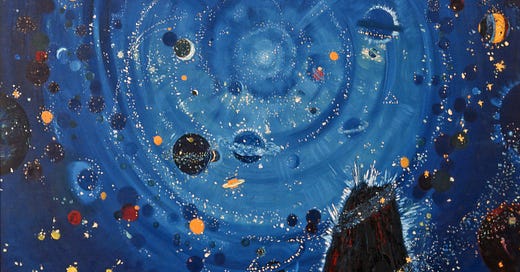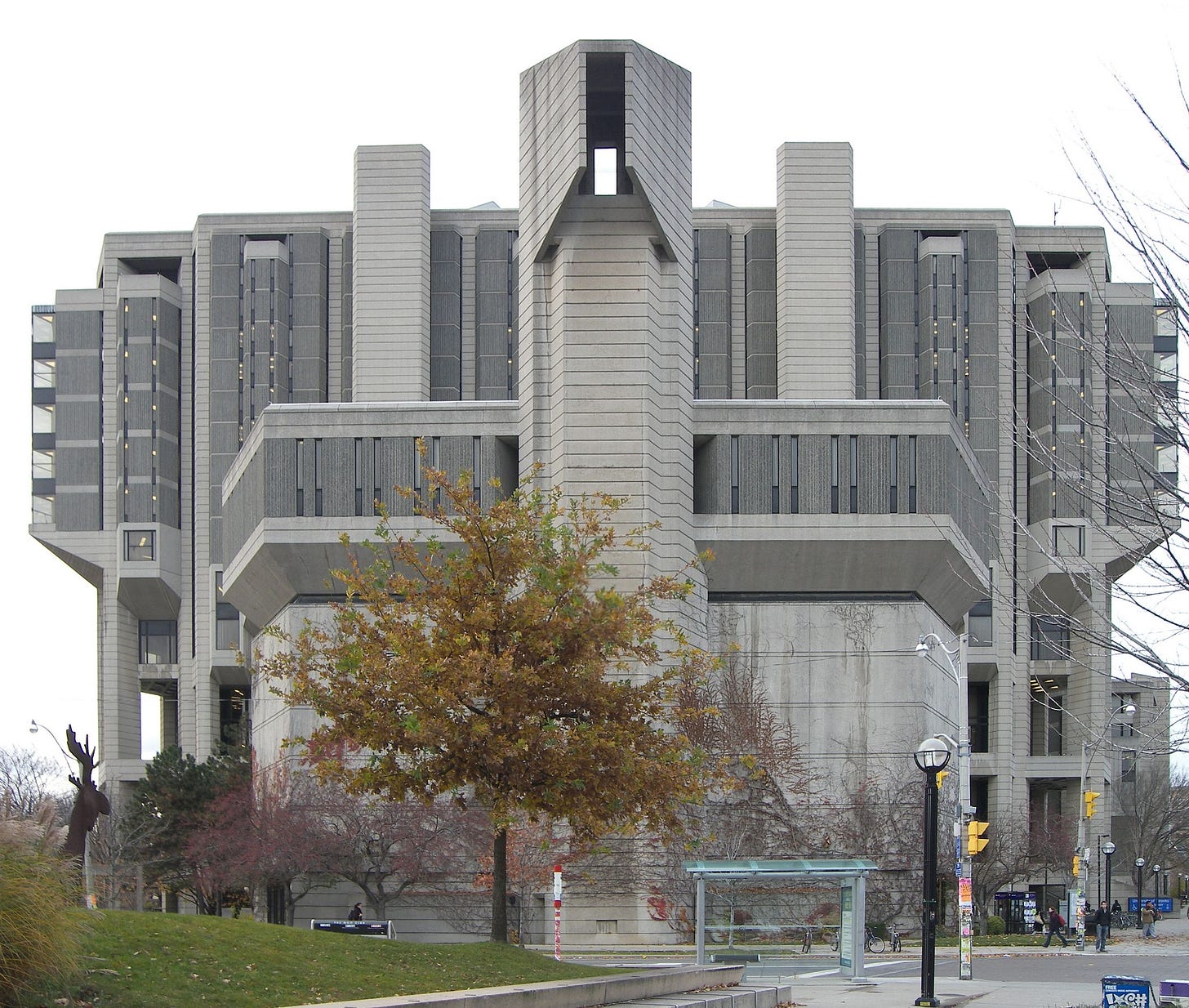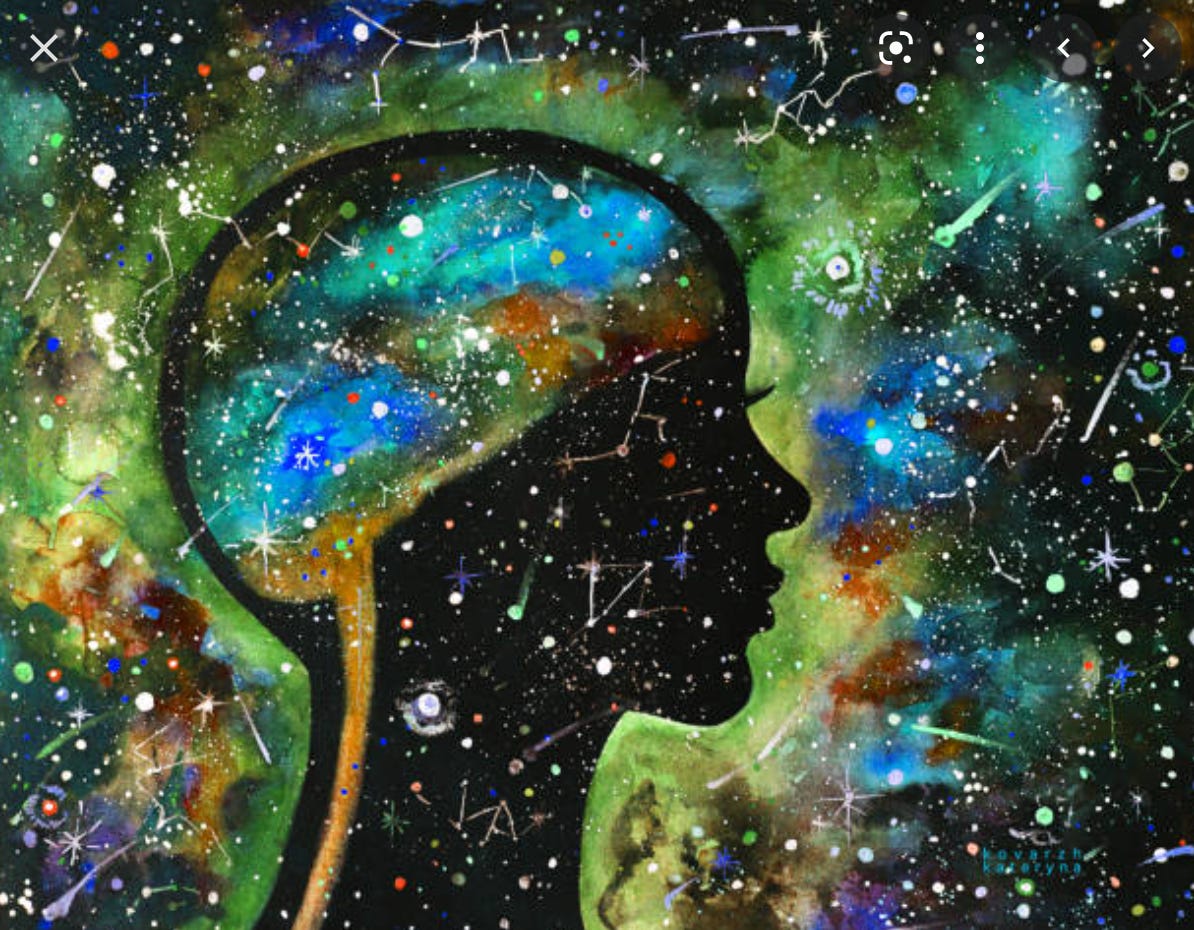Awareness Is the Secret Sauce of Everything Good
AWM #63: On clichés, beauty, empathy, and sentience 🌌
Consider clichés. A cliché is something conventional, unoriginal, overused. Clichés are bad — but why? They’re often true, or at least useful. When you begin a story with “Once upon a time,” you’re setting the atmosphere in a way that’s perfectly acceptable. When you draw a moon to represent the night sky (even if the lunar phase you pick occurs mostly during the day), you’re calling on common symbolic associations that make sense to everyone.
The reason clichés are bad is that they occur automatically. They’re the output of your brain’s autocomplete. They show that you didn’t think about what you’re doing very much; they shows your unawareness. This is not something we want in art.
There are two cures for clichés. The obvious one is to avoid them altogether — but this is hard, and it can lead you astray if you end up making art that’s just weird and unfamiliar to everyone. The less obvious cure is to inject some awareness into your writing/art/etc. Start with “Once upon a time” and them immediately say “Or was it once? No, it actually happened twice. So: Twice upon two times, …” Okay, I’ll admit this is a somewhat lame example, but you get what I mean: you can play with the cliché. You can show the audience that you know what you’re doing. You can break the fourth wall and become complicit with the reader, or you can set up an expectation in their mind that you then artfully subvert, etc.
You can even downright say it’s a cliché! Start a story with “Once upon a time… Wait, that’s a cliché. Let’s try something else. It was a dark and stormy night, and …”
(Of course if you use the same mechanism too much, then you risk turning that into a cliché. You have to remain aware at all levels!)
Self-awareness is one of the greatest lessons I learned from more than a decade of writing. It is a magical secret sauce, able to immediately improve any piece of writing the moment you realize it can be done.
Consider beauty. I’ve written extensively on what beauty truly is, at a fundamental level. My conclusion is that it’s mostly a mechanism that our brains use to pay attention to positive things, for various values of “positive.”
But there’s a way to hack our aesthetic sense. That way is awareness.
In our daily life, we usually tend to become jaded by our surroundings. Everything you own has had an aura of newness at some point, but after a while your tasteful furniture, your well-furnished bookcase, or your cool gadgets cease to be very appealing. They become part of the background decor. You don’t see them; your brain processes them automatically.
You can refocus on anything that has become ordinary to you. Try it now. Look around, find a part of your surroundings (a chair, a book, a piece of clothing) that feels ordinary. Look at it carefully. Take time to notice the details. Reality is fractal, so there are details in the details; notice those too. Notice the context around the thing. The relationship you or other people have with it. Its history; its stories. It’s almost guaranteed that you’ll eventually end up finding beauty in it.
This applies to almost anything. Take an ugly piece of architecture, maybe a decaying Brutalist block of concrete, or anything that recently won the Pritzker Prize. Nobody who’s not an architect likes Brutalism, but I claim that you can make yourself like it if you really try. It’s not that hard. It’s just a matter of focussing your awareness.
Does this matter? Yes — beauty is important, like love. If you see it more, then I believe you can become a generally happier person.
Plus there’s a second way paying attention to your awareness of beauty can be beneficial. When you don’t control what you pay attention to — when you’re unaware — you will tend to find beauty in the things that are traditionally considered beautiful: healthy faces, colors, nature. This can leave you at the mercy of artists and their shady counterparts, marketers. These people know how to manipulate other your perception of beauty to make you react. There’s nothing wrong with that per se, but it is useful to be able to decide what you find beautiful and when. It is useful to be aware.
Consider empathy. Empathy is the capacity to understand, truly understand, other people. It is at the heart of any good relationship. To have a happy marriage, or rewarding friendships, you need to be finely attuned to what your spouse or your friends love and want. When conflicts arise, being able to see the other person’s perspective is your best path out of a hazardous situation. All of that is the skill of empathy. And what is empathy? Awareness of the other.
Broadly speaking, awareness is how we solve our people problems; unawareness is how we create them. You don’t want to be running your relationships with the autocomplete.
This goes beyond relationships. If you want to be good at sales and marketing, you need to know what your customers desire. If you want to be good at politics, you need to know what your society craves.
Empathy, or awareness, is also central to the most important relationship in your life: your relationship with yourself. Do you understand yourself? Do you know what you want, desire, crave — and why? Are you aware of whether your career is being spent on problems that matter to you, as opposed to ones that don’t?
If you’re not self-aware in your relationship with yourself, you risk being swept by the twin currents of what society expects from you and what feels easiest and most pleasurable to your body. You’ll be navigating this on the autopilot, and you won’t really get anywhere interesting.
Consider sentience. To be sentient is to have subjective experiences in your mind. It’s unclear who exactly has sentience — humans do, and probably a number of animals, although it’s not easy to determine which ones. There may be extraterrestrial intelligence out there that is capable of sentience. Artificial life, perhaps, someday. Maybe other beings we have no ability to fathom.
One deep question I often ask myself is whether a universe with no sentient life in it would have any value at all. It seems to me that the answer is probably no — with no one to experience the universe, it might as well not exist. Therefore sentience can be seen as the cause of all value in the universe. It is the reason color, along with everything else, exists.
Sentience is a quasi synonym of awareness. You don’t have to be aware to be sentient, but you have to be sentient to be aware. Awareness is when sentience reaches its pinnacle. When something enters your awareness, it becomes part of your subjective experience. It suddenly exists a little bit more.
Last week, I wrote an extremely broad post about oversimplification, which (if we, ahem, oversimplify) can be thought of as the root of most evil. Awareness is the flip side of that in two ways.
First, the world, and everything in it including people, are complex, and simplification means not being aware of certain parts. When you become more aware, you see a larger fraction of the whole.
Second… awareness is the root of everything good. It is a secret ingredient that you can add to your writing, tour daily life, your relationship, anything really, to make it better, and to make yourself happier.
Of course, awareness is not free. It requires effort! That’s why we’re not aware of everything, all the time. Sometimes we need to tune out the decor of our everyday life so we can focus our awareness on what’s new and interesting. Sometimes we simply need to rest.
I feel that right now, actually. I had grand ambitions for this essay, but it turns out that today, my writing day, is not ideal for grand philosophical writing: I’m tired, and neither the ideas nor the writing come easily. It’s tempting to fall back on my brain’s autocomplete. I know it will make the essay less good than it could have been, but I can’t do much about it if I want to publish on schedule. At least I’m aware of that.
But precisely because awareness is not easy, it means that it can be a superpower, should you decide to wield it.1
It will give you an edge over those who let the autopilot decide. It will make you a better writer, artist, marketer, lover, family member, human. It will make you happier and better. It will do good.
One possible way to get training in this superpower is to study the Alexander Technique, which is about playing with awareness. Michael Ashcroft has an online course on this that I am getting more tempted to buy by the day.









Suddenly, I find that my socks are the most comfortable things in existence. The power of awareness!